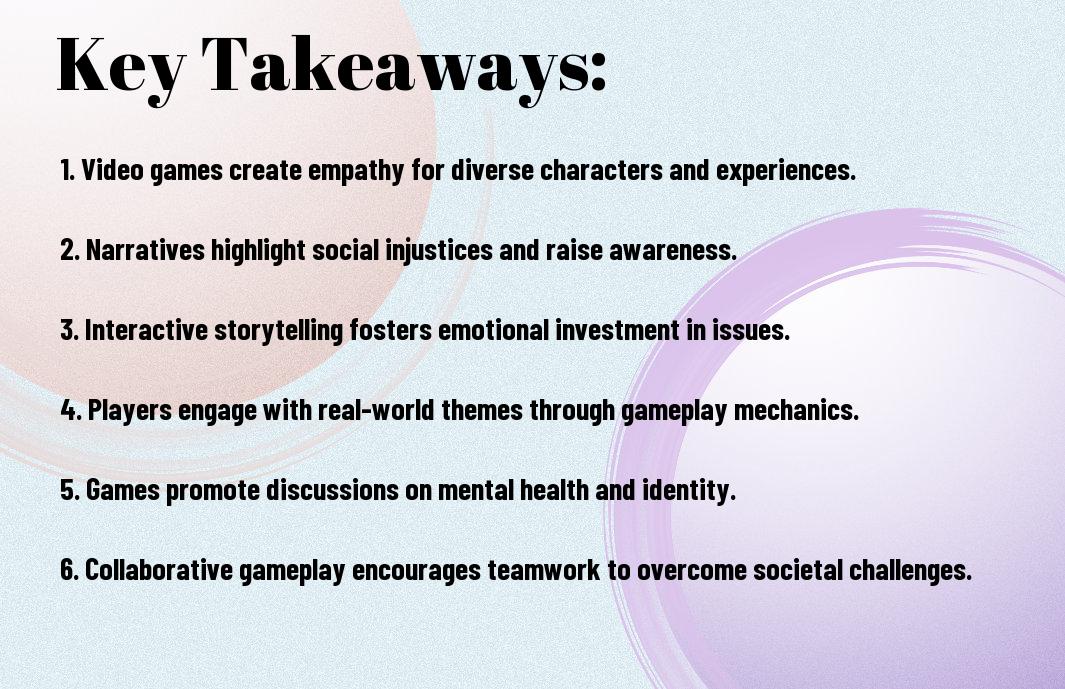As you explore the world of video games, you’ll notice that many titles tackle complex social issues, such as inequality and injustice, through engaging storytelling. You’ll discover that your favorite games often weave in thought-provoking narratives that encourage you to think critically about the world around you. By examining these stories, you’ll gain insight into how video games address social issues, sparking meaningful conversations and inspiring positive change, making your gaming experience more impactful and thought-provoking.
Key Takeaways:
- Video games have the ability to tackle complex social issues, such as racism, sexism, and inequality, through engaging storytelling and immersive gameplay, allowing players to experience and understand different perspectives.
- Games like “This War of Mine” and “Papers, Please” use narrative to highlight the human cost of war and the consequences of bureaucratic oppression, promoting empathy and self-reflection in players.
- Story-driven games can raise awareness about social issues, such as mental health, disability, and LGBTQ+ rights, by incorporating realistic and relatable characters, plotlines, and dialogue.
- The interactive nature of video games enables players to make choices that impact the story, allowing them to explore the consequences of their actions and develop a deeper understanding of the social issues presented.
- Games can also serve as a platform for social commentary, using satire, allegory, and other literary devices to critique societal norms and spark meaningful conversations among players.
- By incorporating diverse characters, settings, and storylines, video games can promote inclusivity and representation, helping to break down stereotypes and challenge players’ assumptions about different social groups.
- Ultimately, the storytelling in video games has the power to inspire positive change, encouraging players to think critically about social issues and take action to make a difference in their own communities and the world at large.
The Evolution of Social Commentary in Games
Your exploration of video games as a medium for social commentary will lead you to consider whether they should address such issues, as discussed in Should video games address social issues?, and how they have evolved over time.
From Simple Narratives to Complex Social Issues
After delving into the history of video games, you’ll notice that they have transitioned from simple narratives to tackling complex social issues, reflecting your changing world and societal concerns.
The Rise of Choice-Based Storytelling
By examining modern games, you’ll find that choice-based storytelling has become a key aspect of the medium, allowing you to engage with social issues in a more personal way.
Consequently, this shift towards choice-based storytelling enables you to experience different perspectives and outcomes, making you more invested in the game’s social commentary and encouraging you to think critically about the issues presented.

Representation and Identity
Some of the most impactful stories in video games come from their ability to tackle complex social issues, allowing you to experience different perspectives and identities. As you play through these games, you’ll notice how they address representation and identity in a way that’s both thought-provoking and engaging.
Gender and Sexuality in Gaming Narratives
Across various gaming platforms, you’ll find narratives that explore gender and sexuality in a way that’s both authentic and relatable, allowing you to connect with characters on a deeper level and understand their struggles and triumphs.
Cultural Diversity and Perspective
By exploring different cultures and perspectives, you’ll gain a broader understanding of the world and its complexities, as video games provide a unique lens through which to experience and learn about various cultural identities and backgrounds.
Hence, as you investigate into games that focus on cultural diversity and perspective, you’ll discover how they can enrich your understanding of the world, allowing you to appreciate the nuances of different cultures and fostering empathy and tolerance, which is crucial in today’s global community, and enabling you to become a more informed and open-minded individual.

Political and Economic Themes
Unlike other forms of media, video games can tackle complex political and economic issues in a unique and engaging way, allowing you to experience different perspectives and scenarios firsthand.
Power Structures and Authority
For instance, you can explore the impact of authoritarian regimes and corrupt governments on individuals and societies, and consider how your own actions can influence the balance of power in a virtual world.
Resource Distribution and Class Struggle
Between the haves and have-nots, video games often highlight the disparities in resource distribution, enabling you to witness the consequences of economic inequality and ponder your own role in perpetuating or challenging these systems.
It is through these virtual experiences that you can gain a deeper understanding of the complexities surrounding resource distribution and class struggle, and develop a more nuanced perspective on the social and economic issues that affect your own community, allowing you to think critically about your own place within the larger economic landscape and how your choices can impact others.
Environmental Messaging
Now, as you explore the world of video games, you’ll notice that many titles incorporate environmental messaging into their storytelling, prompting you to think about the impact of human actions on the planet. You can find discussions on How can video games tell more nuanced stories like TV and film, which often tackle complex issues like climate change.
Climate Change and Conservation
At the forefront of environmental messaging in video games is the issue of climate change and conservation, where you, as a player, are tasked with navigating the consequences of environmental degradation and finding ways to mitigate its effects.
Human Impact on Virtual Worlds
Changing the way you think about your actions in virtual worlds, many games now highlight the human impact on the environment, encouraging you to consider the consequences of your in-game decisions.
Even as you play games that allow you to build and manage your own virtual worlds, you’re forced to confront the consequences of your actions, such as pollution, deforestation, and resource depletion, making you think about your real-world impact and how you can make a positive change.
Mental Health and Personal Struggles
Many video games tackle mental health and personal struggles, offering you a unique perspective on these complex issues. You’ll find that these games often use storytelling to convey the emotional depth of their characters, making you invested in their journeys.
Character Development Through Trauma
Traumatizing events shape characters, allowing you to understand their motivations and backstories. You see how trauma affects their behavior, making their development more believable and relatable.
Healing and Recovery Narratives
Across various games, you’ll encounter stories of healing and recovery, which provide you with a sense of hope and resilience. You’ll witness characters overcoming their struggles, and this can be a powerful experience.
Through the portrayal of healing and recovery narratives, you can gain a deeper understanding of the complexities of mental health. You’ll see that recovery is a journey, with ups and downs, and that it’s okay to not be okay. As you play these games, you’ll be reminded that you’re not alone in your struggles, and that seeking help is a sign of strength, not weakness.
Social Justice and Activism
For many players, video games offer a unique perspective on social justice and activism, allowing you to experience different worlds and scenarios that raise awareness about important issues. You can engage with stories that highlight social injustices, encouraging you to think critically about your own beliefs and values.
Player Agency in Social Change
Behind the engaging narratives, you’ll find that many games provide you with the opportunity to make choices that impact the story, allowing you to feel invested in the social change you’re witnessing. You can influence the outcome of events, making your experience feel more personal and immersive.
Consequences and Moral Choices
Changing the way you think about social issues, video games often present you with difficult moral choices, forcing you to consider the consequences of your actions. You must weigh the pros and cons of each decision, thinking carefully about how it will affect the game’s world and characters.
To further explore the concept of consequences and moral choices, you can analyze how games use branching storylines and multiple endings to illustrate the impact of your decisions. You’ll notice that your choices can lead to vastly different outcomes, teaching you about the complexity of social issues and the importance of considering multiple perspectives. As you play, you’ll develop a deeper understanding of the social issues presented, and you’ll be encouraged to think critically about your own role in creating positive change.
Final Words
From above, you can see how video games tackle social issues through storytelling, offering your a unique perspective on complex problems. As you engage with these games, you gain a deeper understanding of the world and its challenges. Your experience is enriched by the immersive narratives, allowing you to empathize with characters and their struggles, ultimately broadening your understanding of social issues and their impact on individuals and society.
FAQ
Q: How do video games use storytelling to address social issues like racism and discrimination?
A: Video games often use narrative techniques such as character development, dialogue, and plot twists to tackle complex social issues like racism and discrimination. For example, games like “This War of Mine” and “Life is Strange” feature characters from diverse backgrounds and experiences, allowing players to engage with and understand different perspectives on these issues. By presenting these issues in a virtual environment, games can provide a safe space for players to explore and learn about sensitive topics, fostering empathy and encouraging players to think critically about the world around them.
Q: Can video games effectively raise awareness about mental health issues, such as anxiety and depression, through their storytelling?
A: Yes, many video games use storytelling to address mental health issues, aiming to reduce stigma and promote understanding. Games like “Night in the Woods” and “Hellblade: Senua’s Sacrifice” feature characters struggling with mental health issues, portraying their experiences in a realistic and relatable way. By sharing these stories, games can help players recognize the signs and symptoms of mental health conditions, encouraging them to seek help and support. Additionally, games can provide resources and information about mental health, further promoting awareness and education.
Q: How do video games incorporate real-world social issues, such as climate change and economic inequality, into their narratives and gameplay mechanics?
A: Video games often incorporate real-world social issues into their narratives and gameplay mechanics to raise awareness, promote discussion, and encourage players to think critically about these issues. For example, games like “Eco” and “This War of Mine” feature gameplay mechanics that simulate the consequences of environmental degradation and economic inequality, respectively. By presenting these issues in a virtual environment, games can help players understand the complexities and challenges of addressing these problems, as well as the importance of individual and collective action in creating positive change. This can inspire players to take action in the real world, promoting a sense of social responsibility and civic engagement.
